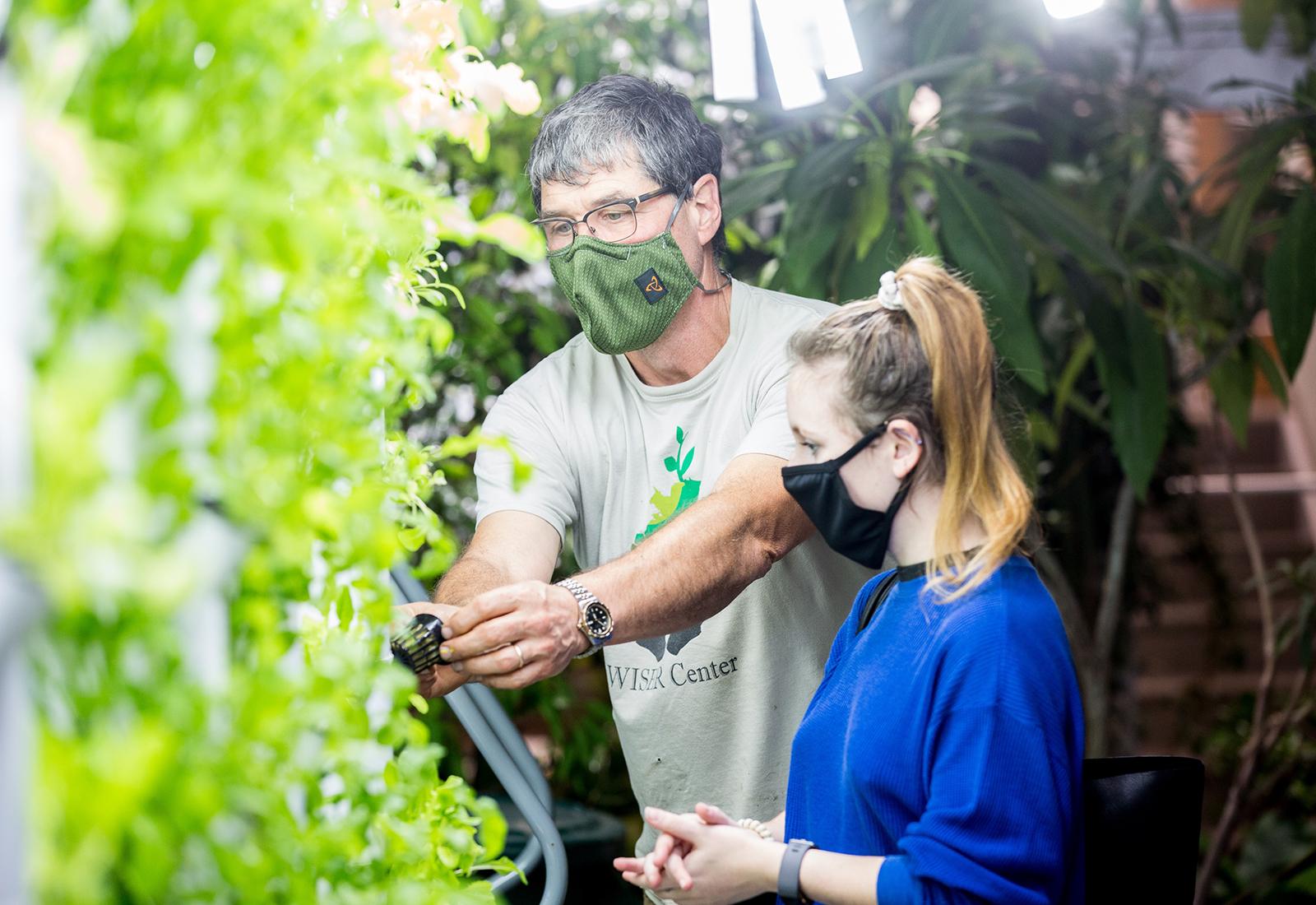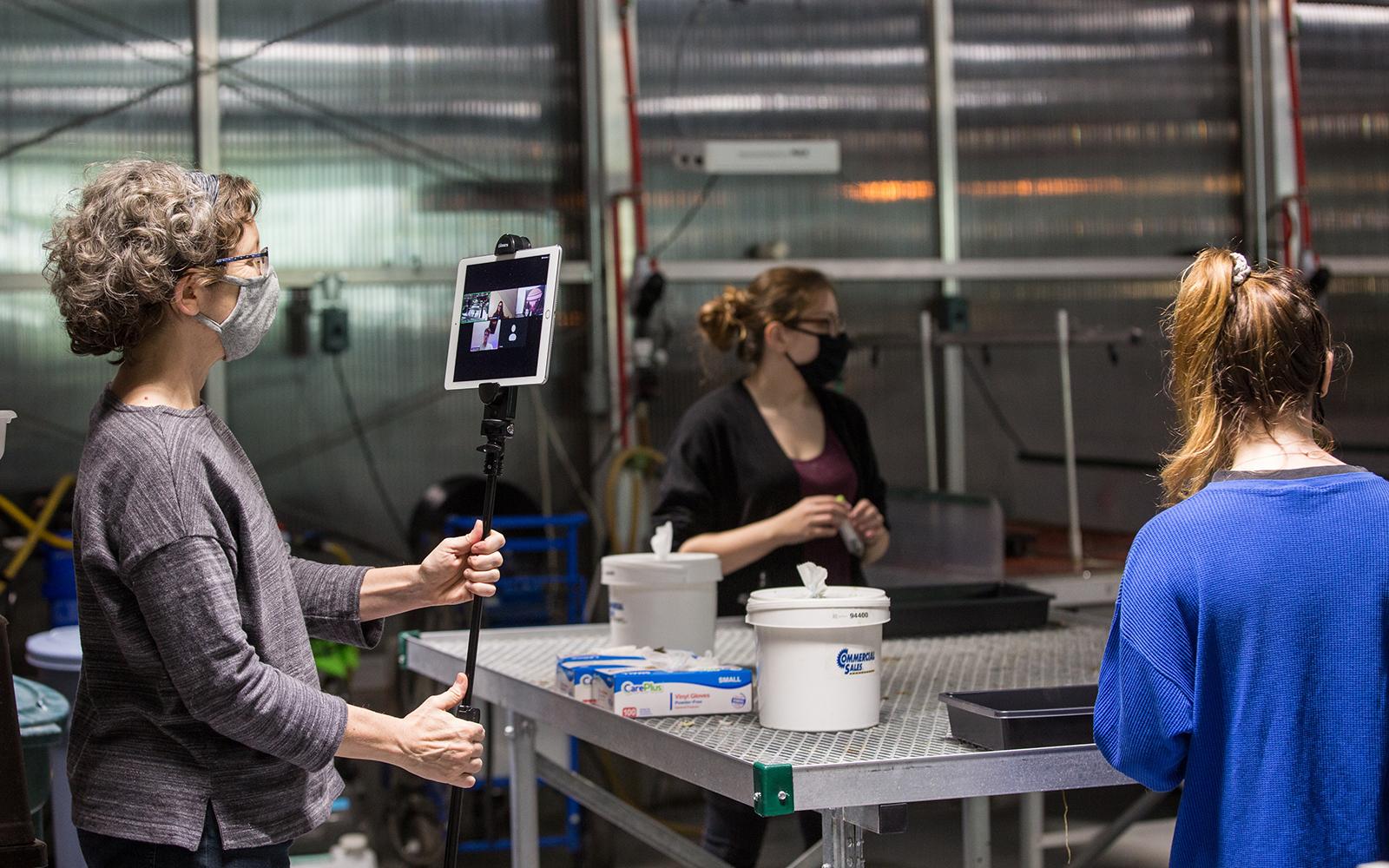SUNY Potsdam Instructors Pioneer Problem-Based Learning to Push Frontiers of Teacher Education

WISER Center Coordinator Ray Bowdish and teacher education student Veronica Borracci place seeds in a tower garden at one of the center’s greenhouses, part of lesson in using problem-based learning to energize teaching practices.
Like a Zen riddle, the question was simple but had a deceptive depth: How can a Swiss chard seed help a student become an engaged reader?
Surrounded by waves of green and bent over trays in the Wagner Institute for Sustainability and Ecological Research (WISER) Center greenhouse on the SUNY Potsdam campus, Marta Albert’s teacher education students stared at the tiny seeds in their palms and grappled with a question that upends traditional learning models.
“Problem-based learning can be an uncomfortable way to teach,” said the center’s coordinator Ray Bowdish, who has worked since 2016 with Albert to merge concepts of sustainable agriculture with the frontiers of pedagogical technique. “Traditionally most of us have wanted to be the sage on the stage telling students what we know. Problem-based learning makes you be the guide on the side.”
The class highlighted two tectonic shifts happening in education — the first a subtle and enduring one as teachers realize there are students they’ll never reach unless they work to engage the mind through the hands. The second shift is sending shock waves through the nation’s entire education system as video technology becomes an indispensable tool to teach, a development accelerated by restrictions of the coronavirus pandemic and the need to reach students at home.

“We've all become mini media production companies, in addition to teaching,” said Albert, a literacy program associate professor and assistant chair of the SUNY Potsdam Department of Advanced Studies in Education, gripping a tripod and tablet whose camera connected the day’s lesson to the members of her Reading in Middle and Secondary Schools class who chose to study remotely.
The greenhouse’s tower gardens were central to the lesson — a scalable indoor apparatus growing an abundance of greens in vertical columns using no soil. Albert finds them so valuable to energizing inquiry that she keeps a tower garden in one of her classrooms, even though she is helping shape future educators, not farmers.
“SUNY Potsdam pre-service secondary educators are learning how to connect the disciplines they are preparing to teach — mathematics, science, history, social sciences — to real-world issues and contexts,” she said. “We do it by engaging in hands-on, project-based experiences. We also work together to pose questions and explore problems.”
A seed is full of unexpected answers and an equal number of questions, which are just as important. Bowdish recalled the rapt attention of a recent group of students witnessing the act of germination.
“Teachers must figure out how to lock onto these fascinations,” he said. “It’s about getting away from the idea of transmitting the ideas of an expert to a novice.”
The coursework for the class draws from Michael Pollen's book “The Omnivore’s Dilemma: A Natural History of Four Meals,” adapted to an eighth-grade reading level while engaging students in the study of food systems. The goal is for future teachers to feel empowered and comfortable in the driver’s seat of their own learning, and ready to think critically rather than formulaically about ways they will guide the young minds in their care.
How a seed can become a teacher is a question each has to answer for themselves.
“This gave me a new perspective for incorporating food literacy topics into problem-based lessons,” said Faith Gatto, who is on course to graduate in 2023 with a double major in mathematics and secondary education. “I’ve gained a better understanding of the benefits of problem-based learning and giving the students a chance to solve real-world problems in the classroom.”
The School of Education and Professional Studies at SUNY Potsdam has been preparing educators for more than 200 years. Today, that legacy of educational excellence also stretches to undergraduate and graduate programs in business administration, public health and human performance, to help students prepare for professions in the global economy. For more information, visit https://www.potsdam.edu/academics/SOEPS.
About SUNY Potsdam:
Founded in 1816, The State University of New York at Potsdam is one of America’s first 50 colleges—and the oldest institution within SUNY. Now in its third century, SUNY Potsdam is distinguished by a legacy of pioneering programs and educational excellence. The College currently enrolls approximately 3,600 undergraduate and graduate students. Home to the world-renowned Crane School of Music, SUNY Potsdam is known for its challenging liberal arts and sciences core, distinction in teacher training and culture of creativity. To learn more, visit www.potsdam.edu.
